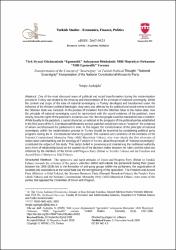Türk Siyasal Düşüncesinde “Egemenlik” Anlayışının Dönüşümü:Milli Meşrutiyet Fırkasının “Milli Egemenlik” Yorumu
Özet
Modernleşme süreci Türkiye’sinde siyasi ve sosyal dönüşümün çok tartışılan alanlarından biri de milli egemenlik prensibinin anlam ve yorumlanmasına ilişkindir. Türkiye’de milli egemenlik düşüncesinin muhteva ve kapsamı, Batı siyasal ideolojilerinin tesirinde gelişip dönüştüğü gibi, Osmanlı Devleti’nin içerisinde bulunduğu siyasi ve sosyal hadiselerden de etkilenmiştir. Osmanlı Devleti’nden ulus devletine geçiş sürecinde Milli egemenlik prensibinin “padişahın” kutsal mevcudiyeti ile nasıl uyumlulaştırılabileceği, daha açık birifade ile padişahın varlığının, Osmanlı halkı üzerindeki haklarının nasıl sürdürülebileceği bir sorun olmuştur. II. Meşrutiyet döneminin ilk yıllarında kurulan siyasal partilerin programlarında, kutsal bir şahsiyet olan padişaha bağlılık ifade edilirken, zamanla padişah, varlığı meclise gölge düşüren bir hükümdara dönüşecektir. Bu bakımdan Türkiye’de modernleşme süreci içerisinde milli egemenlik prensibinin dönüşümü II. Meşrutiyet dönemi siyasal parti programları dikkate alınarak incelenmelidir. Türkiye’deulus devlet anlayışının ve Türkçülük ideolojisinin açık olarak ilk savunucusu Milli Meşrutiyet Fırkası’nın, mensuplarının “milli egemenlik” ilkesi hakkında görüş ve yorumları bu çalışmanın konusunu teşkil edecektir. Söz konusu fırkanın geleneksel otoriteyi, yöneten ile yönetilenler arasında var olan, karar vericinin üstünlüğüne dayanan bir ilişki biçimini koruma ve sürdürme inancı, İttihat ve Terakki Fırkasıve Hürriyet ve İtilaf Fırkası mensuplarınca eleştirilmiş ve fırka yalnızlaştırılmıştır. One of the most discussed areas of political and social transformation during the modernization process in Turkey was related to the meaning and interpretation of the principle of national sovereignty. While the content and scope of the idea of national sovereignty in Turkey developed and transformed under the influence of the Western political ideologies, they were also affected by the political and social events in which the Ottoman State was included. In the process of transition from the Ottoman State to the nation-state, how the principle of national sovereignty could be harmonized with the sacred existence of the padishah, more clearly, how the rights of the padishah's existence over the Ottoman people could be maintained was a problem. While loyalty to the padishah, a sacred character, as indicted in the programs of the political parties established in the first years of the II. Constitutional Monarchy period, padishah would turn into an "emperor" the existence of whom overshadowed the parliament in time. In this regard, the transformation of the principle of national sovereignty within the modernization process in Turkey should be examined by considering political party programs during the II. Constitutional Monarchy period. The opinions and comments of the members of the National Constitutional Monarchy Party (Milli Meşrutiyet Fırkası), who were clearly the first advocates of nation-state understanding and the ideology of Turkism in Turkey, about the principle of "national sovereignty" constituted the subject of this study. This party's belief in preserving and maintaining the traditional authority and a form of relationship based on the superiority of the decision-maker between the rulers and the ruled was criticized by the members of the Union and Progress Party (İttihat ve Terakki Fırkası) and the Freedom and Accord Party (Hürriyet ve İtilaf Fırkası).
Kaynak
Turkish Studies - Economics, Finance, PoliticsCilt
15Sayı
4Bağlantı
https://app.trdizin.gov.tr/makale/TkRJeU1qRXpNdz09https://hdl.handle.net/20.500.11857/1832
Koleksiyonlar
- Makale Koleksiyonu [443]
- TR-Dizin İndeksli Yayınlar Koleksiyonu [1037]



















